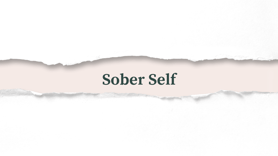Why You Don’t Need to Hit Rock Bottom to Reevaluate Drinking
You don’t need to wreck your life to want something better. For high-achieving women stuck in the grey area—where alcohol isn’t destroying everything, but it’s draining something—the decision to take a break is an act of power, not punishment. This post breaks down the myth of “rock bottom,” how grey area drinking works, and why pausing (not quitting forever) can be one of the strongest things you ever do.
6/5/20252 min read


The Myth of Rock Bottom
We’ve all seen it: the Hollywood version of alcoholism that ends in a lost job, a DUI, or some dramatic moment of collapse. It’s powerful, yes—but also misleading.
The truth? Most women who rethink drinking don’t hit rock bottom. In fact, many are thriving on the surface. They’re building careers, running homes, showing up for everyone—but they’re also quietly wondering why they feel so off.
You don’t have to lose everything to ask:
“Is this working for me anymore?”
Reevaluating your relationship with alcohol isn’t an admission of failure. It’s a conscious act of self-respect.
What Grey Area Drinking Really Feels Like
Grey area drinking lives in the in-between. You’re not drinking daily… but when you do, it’s harder to stop than you expected. You’re not dependent… but you do feel “off” without it. You can go without it… but why does that feel so edgy?
Here’s what grey area drinking often looks like for high-performing women:
You look forward to wine o’clock a little too much
You set “rules” (only on weekends, only one glass) and often break them
You question whether this is normal, but talk yourself out of worrying
You function well—but feel foggy, anxious, or regretful more than you’d like
If this sounds familiar, you’re not broken. You’re just stuck in a subtle trap no one talks about.
Red Flags That Don’t Look “Serious”
Grey area drinking doesn’t scream for help—it whispers:
“It’s just one glass, I deserve it.”
“I don’t drink every day.”
“Everyone else drinks like this.”
But these soft red flags are easy to overlook:
You find it hard to relax or socialize without a drink
You wake up at 3 a.m. with anxiety or guilt
You secretly wish you drank less—but don’t want to say it out loud
You don’t identify with the word alcoholic, but something feels off
These aren’t signs of failure. They’re signals that you’re ready for a shift.
How to Start Without Pressure
You don’t need to declare you’re sober forever. You don’t need to explain yourself to anyone.
All you need is curiosity.
Start by asking:
What is alcohol really doing for me?
What am I avoiding or soothing?
How would I feel after 7 days without it?
Think of it as an experiment—not a life sentence. You’re not giving something up; you’re opening yourself up.
30-Day Break = Empowerment, Not Endgame
Choosing to take a 30-day break from alcohol is not about proving you have a “problem.” It’s about:
Reclaiming your energy
Resetting your sleep and mood
Discovering how you cope without reaching for a drink
Realizing how strong and steady you really are
It’s not the end—it’s a beginning.
And if you decide to return to alcohol after 30 days, that’s your choice. But you’ll be doing it with full awareness, not on autopilot.
Resources to Get Started
✨ Want to know where you land on the drinking spectrum?
➡ Take the Grey Area Drinker Quiz
📘 Ready to take a powerful pause?
➡ Download your FREE 30-Day Alcohol-Free Guide
These resources are made for women like you—smart, successful, and ready for more clarity, not less freedom.
You don’t need to wait until it’s bad. You can choose better while life still looks good. That’s not weakness—it’s wisdom.
